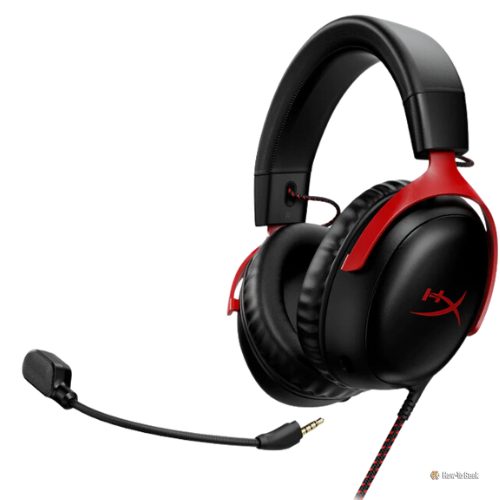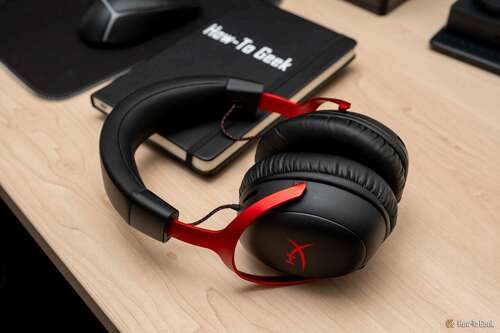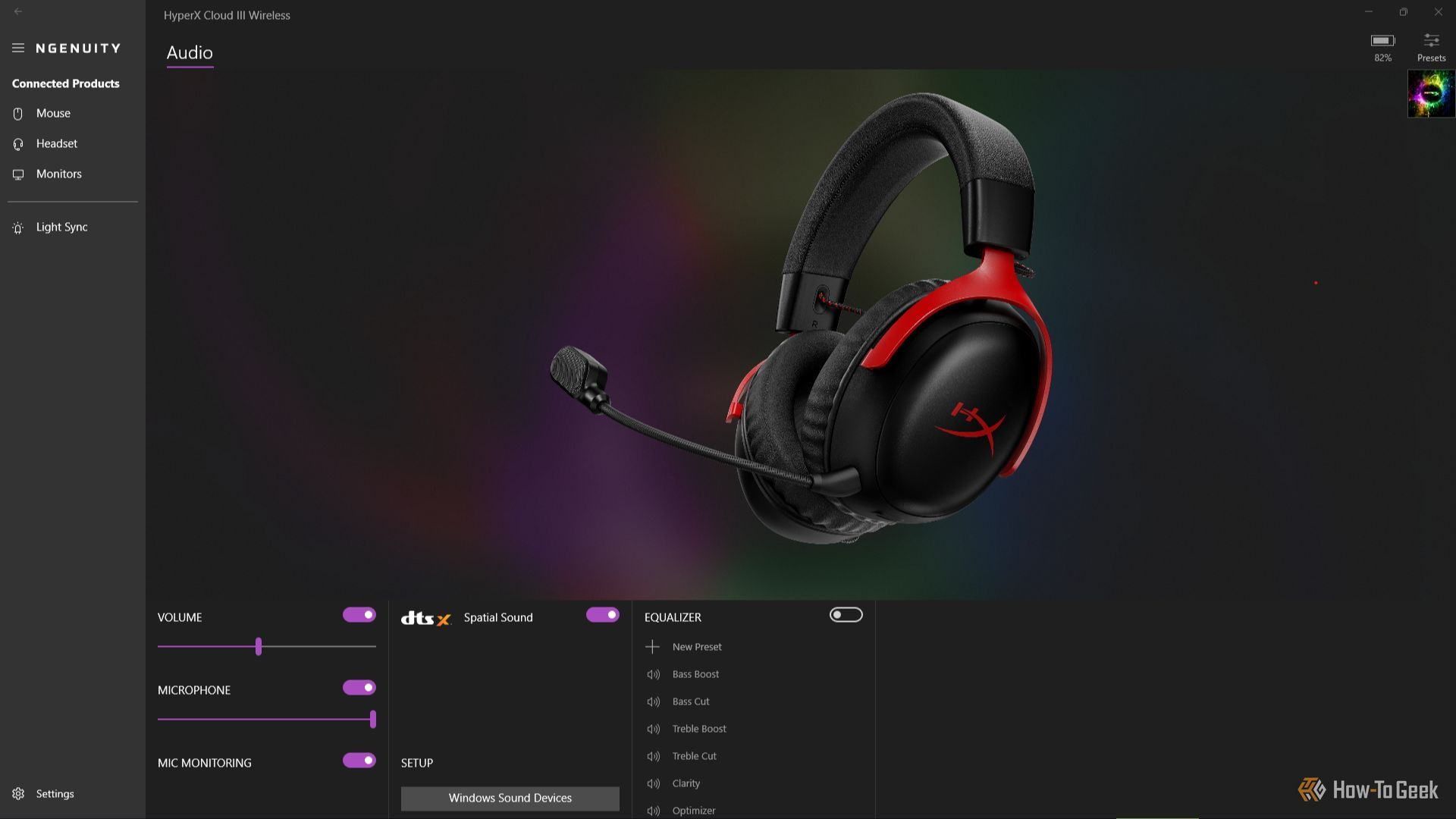Key Takeaways
- HyperX Cloud III Wireless Headset provides immersive sound quality with 3D spatial audio, making it ideal for gamers looking for a mid-range option.
- The headset features a comfortable fit for extended wear, but the leatherette material can get hot after prolonged use.
- The microphone offers crisp communication with effective noise cancellation, and the headset has a long-lasting battery life of approximately 90 to 100 hours.
Sound design is a big part of the gaming experience, especially with the prevalence of 3D audio. With most built-in TV speakers producing a relatively subpar sound quality, it’s up to brands like HyperX and its Cloud III Wireless Headset to capture the full-bodied auditory magic of modern video games.
I should preface this review by saying that shortly before I started using the Cloud III Wireless Headset, I made a permanent switch to its wired alternative. The differences between the two are negligible save for the obvious distinction between a wired and wireless device. I’ll touch on the wired model later, but now’s the time I gush about the quality of this mid-range wireless option.
HyperX’s Cloud III Wireless is far from the perfect gaming headset, but there’s enough of a balance between the impressive audio and minor flaws that I don’t see a need to replace it with a more expensive option like the costlier and slightly higher-end Audeze Maxwell Wireless Gaming Headset.


HyperX Cloud III Wireless Gaming Headset
HyperX Cloud III Wireless Headset is a mid-range option for gamers looking to experience 3D spatial audio and enjoy crisp communications. DTS Headphone:X enhances play with an immersive sound quality that’s ideal for casual consumers. With a few tweaks to the overall design, the Cloud III Wireless headset could stand up to more premium options.
- Brand
- HyperX
- Compatibility
- PC, PS4, PS5, Nintendo Switch
- What’s Included
- Detachable microphone, USB-C to USB-C charging cable
- Connection
- 2.4 GHz
- Driver
- 53mm with Neodymium magnets
- Frequency Response
- 10Hz-21kHz
- Spatial Audio
- DTS Headphone:X
- Microphone
- Electret condenser
- Noise Cancellation
- Built-in mesh filter
- Ear Cushions
- Memory foam and leatherette
- Battery Life
- ~100 hours
- Charge type
- USB-C
- Charge Time
- ~2.5 hours
- Weight
- .70 lb (31 kg) w/ microphone
- 3D spatial audio enhances immersion
- Long-lasting battery life
- Crisp microphone with effective noise cancellation
- Leatherette material can get hot
- Runs on older drivers
- No Xbox compatibility
Design and Fit
The HyperX Cloud III Wireless Headset I tested was slightly different in appearance from the wired model. This version sported a black cushioned headband and earpads against a vibrant red metallic frame. The colored frame is such a minor difference from the black-on-black option. However, at first glance, it does read like a more premium model, especially with the red HyperX logo on the earcup instead of a black one.
The fit was nice around my somewhat large head, even after three hours of defending the planet from the insect invaders of “Earth Defense Force 5.” Having used the wired model extensively, I already knew that the cushions were mostly suitable for extended wear, though they could benefit from added firmness. There was no squeezing or tightness around my ears, but the cushions needed something to minimize heat generation. After only an hour, a small ring of sweat formed around my ear. A switch to real leather or fabric cushions could fix this, as synthetic leather is less breathable.
The only real issue I had with the fit was when I tried to wear my Razer Anzu Smart Glasses, which have slightly larger temples than standard glasses. There was noticeable squeezing as the headset and temples struggled against one another, making it very difficult to use the glasses. Granted, I wouldn’t be using the built-in speaker and microphone of the smart glasses, but I like them for blue light filtering.
HyperX audio controls are simple and convenient with a small dial and microphone toggle with LED indicator placed on opposite earcups. There’s a power button near the microphone toggle, but it’s an entirely different shape, so there’s no mistaking one for the other.
Sound and Microphone Quality
I chose “Earth Defense Force” as one of my test games for a particular reason. It may not be known for its use of the latest in high-end audio technology, but the game is absolute chaos with sound. I was curious how well the angled 53mm drivers, which are the same ones used in the Cloud II, would mix everything together. To my delight, the sound was clearer and more distinct than from my TV speakers. All that chaos, from the machine gun fire to EDF soldiers spontaneously singing, was more isolated and less one jumbled mess.
“Earth Defense Force” doesn’t really thrive on its impeccable sound design, though. At least not in the same way “Dead Space” (2023) does, and so I knew I had to test how well the DTS Headphone:X Spatial Audio fared in the depths of space.
I was immediately uncomfortable with how alive the USG Ishimura sounded in my ears. Every squelch, creak, distant roar, or broken motorized door kept me uneasy. Spatial audio is one of the best things to happen to gaming, and it’s wonderful to see companies like HyperX embrace it.
I do wish HyperX had upgraded the drivers, but with DTS Headphone:X stealing the show, it’s an oversight that’s easy to overlook. I honestly don’t know what I could be missing with newer drivers and I don’t think it’s worth agonizing over when HyperX can squeeze a lot of out of its 53mm option.
A Suitable Tool for Communication
I’ve worked with headsets in the past where the microphone was an afterthought. It was there for the aesthetic and to just give the player hope that their teammates would be able to hear them. That’s not the case with the Cloud III Wireless. The detachable mic features a built-in mesh filter that cuts down on background noise to not impede your voice.
The microphone tests I performed delivered positive results. Noise cancellation has been retooled from the Cloud II to tackle background noise a little less aggressively. When I briefly worked with the Cloud II, the mic occasionally muddied my voice and blended it into the background. I found no similar issues with Cloud III.
Battery and Connectivity
HyperX made the interesting decision to limit connectivity to the included 2.4GHZ dongle. There’s no option for Bluetooth. Granted, the former delivers better audio quality, but not offering Bluetooth means the headset won’t seamlessly work with mobile devices.
Xbox owners are also out of luck, as it only connects through a USB-C dongle. The headset does come with a USB-C to USB-A adapter so you can easily use it on all PCs, the PS4, and the Nintendo Switch. If you’re an Xbox gamer, luckily the wired option is compatible, so you can still benefit from HyperX’s quality audio experience.
The Cloud III boasts a battery life of 120 hours. That’s at peak performance with DTS X off and no microphone. When used as intended, you’re probably looking closer to 90 to 100 hours, which is still a great chunk of time. I used the headset for about five hours and it had just dipped to 80% from 100%. Charging was simple enough with the included USB-C charging cable.
The NGENUITY App
Virtually everything has a companion app these days, and HyperX’s suite of accessories and peripherals are no exception. The Windows-exclusive NGENUITY App is your backstage access to Cloud III’s settings, including a toggle for DTSX Spatial Sound and a full equalizer. Unless you really want to tinker with the bass, treble, and other settings, there’s little reason to use NGENUITY. There is a battery indicator, which is nice, but the app is better suited for devices with programmable buttons, like the Pulsefire Haste 2 mouse I use.
Pricing and Availability
The HyperX Cloud III Wireless Headset is available in an all-black or black-and-red motif for $169.99. Compared to similar quality or higher-end headsets, like the Audeze Maxwell, it’s a reasonable price.
For reference, the Maxwell features 90mm Planar Magnetic Drivers, offers Bluetooth 5.3 connectivity, and has an aluminum and steel frame for $299. Alternatively, Razer’s Kaira Pro headset boasts 50mm TriForce Titanium drivers and memory foam ear cushions with only a 20-hour battery life for $149.99. The wireless Cloud III’s price is reasonable for what you get.
If you want to save a little, the Cloud III Wired Headset retails for only $99.99 and works on all modern gaming consoles.
Should You Buy the HyperX Cloud III Wireless Headset?
As someone who games primarily on the Xbox, its exclusion from the list of compatible devices is disappointing, if not understandable. On my PC and PS4, though, HyperX’s Cloud III Wireless Headset performed very well. When it could, it made use of its DTS Headphones:X Spatial Audio, terrifying me in ways that I initially missed during my first playthrough of “Dead Space.” Though the 53mm drivers are a generation old, they’re still able to deliver a high-quality audio experience. As for the microphone, the built-in mesh filter and noise cancellation help ensure that your voice and little else filters to your fellow players.
The headset being wireless didn’t seem to have any bearing on the overall quality. I struggled to find differences in the wired and wireless options—they’re on an even playing field and built identically. The 2.4GHz wireless holds up well, even in an office full of wireless devices, and not once did I lose a connection.
The Cloud III Wireless Headset is comfortable and built to last, though I do wish HyperX would drop the synthetic rubber cushions for something more breathable. If not for how hot my ears were getting, I could easily wear the headset for hours without needing to give my temple a break. Becasue with a rather extensive battery life of approximately 90 to 100 hours, the wireless headset is meant to be worn for long periods.


HyperX Cloud III Wireless Gaming Headset
HyperX Cloud III Wireless Headset is a mid-range option for gamers looking to experience 3D spatial audio and enjoy crisp communications. DTS Headphone:X enhances play with an immersive sound quality that’s ideal for casual consumers. With a few tweaks to the overall design, the Cloud III Wireless headset could stand up to more premium options.



